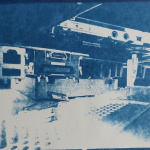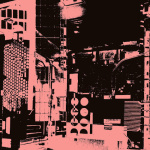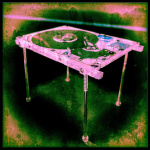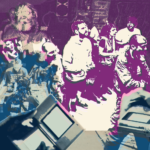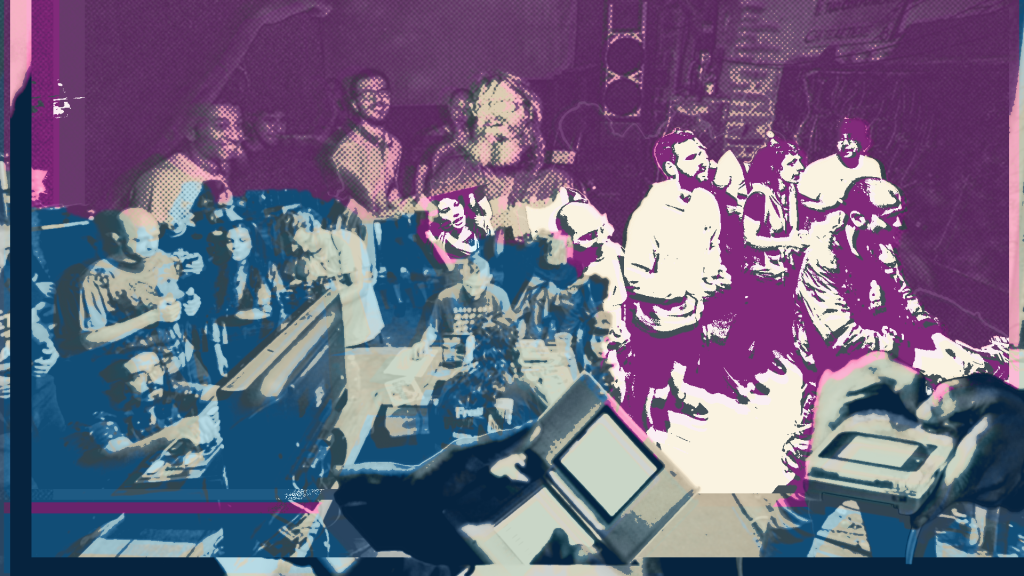The Italian gaming event Zona Warpa is “the travelling festival of rebel video games.”
Or a “space-cultural distortion” as the members of its organising collective Collettivo Warpo (which I’m part of) define it. Its first edition took place in 2023, and with Zona Warpa we tried to build a different kind of video game festival, for a different society, and a different video game scene. This is why and how we did it, as told by the people who realised it with me.
(The following interviews were conducted via phone and video call, and have been heavily cut and edited for brevity and clarity)
Fabio “Kenobit” Bortolotti is a translator, a musician, a political agitator and a content creator known for his wholesome retro-focused gaming streams. Fabio is the most public face and one of the first and most active members of Collettivo Warpo.
“Corporate gaming events have no space for people making games completely outside the mainstream market of both big-budget and so-called-indie games. The very people who could make the most out of the incredible potential of the video game medium are excluded because they lack the resources, the knowledge or the resources to acquire the knowledge.
But if we destroy these entry barriers, the future video game scene will contribute to new social networks in which we are neither producers nor consumers but a community with shared passions, ideas to communicate and the desire to create beautiful things together, to form alliances and to make friends.
I want events where video games can meet the other branches of the underground art world and can create moments of sociality, temporary autonomous zones in which gaming is both main and side dish.
Gaming can be an opportunity to do things together, while nowadays it makes you feel alone, due to the production systems that have a hegemonic role in shaping video games.”
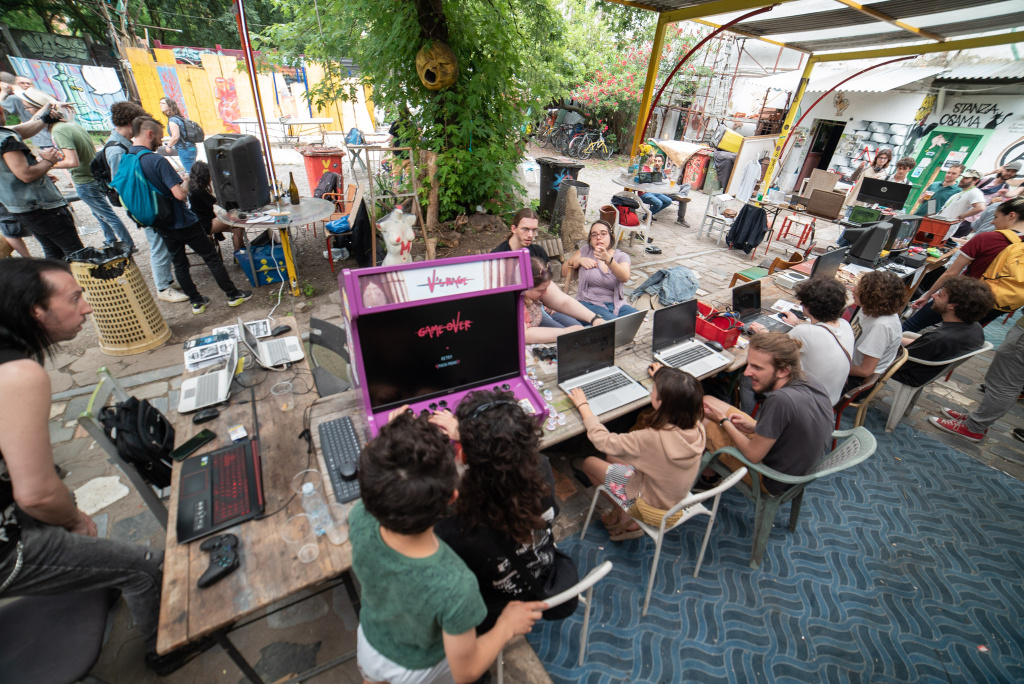
Game showcase at Cascina Autogestita Torchiera senzacqua – Milan, credit: Videogamo
The main tour of Zona Warpa’s 2023 edition started in Milan, in Northern Italy, on 9 June, and ended in Naples, in the south, on the 18th. We visited cities like Genoa, Florence, Siena and Rome on the way and brought Zona Warpa to squatted social centres (where we could find a place to crash, too), community-managed spaces and other places we considered coherent with our manifesto.
In each location, game developers could come and exhibit their video games for free. The stages were occasions to gather the various local scenes, to test video games and have video games tested (a rare opportunity for small teams) and to meet game developers and video game players interested in the more niche, experimental, underground and sometimes amateurish side of video game making.
Some of the developers only came to one of the cities, some decided to follow at least part of the tour and join our caravan, and some even improvised events, embracing the flat organisational structure of Zona Warpa. We didn’t want people to feel like they were customers of a service or a passive audience but part of something we were making all together.
Federico Simonetti is a member of Collettivo Warpo and helped organise the Rome and Naples stages of Zona Warpa. He is one of the founders of Ex Machina, a series of seminars on the relationship between philosophy and video games.
“Video games are a means of expression, but they are also tools to direct our imagination. A video game like Final Fantasy has had a bigger impact on my education than my political party, because that kind of structured left-wing political party no longer existed in Italy when I started to deal with politics and I had to get my political education from pop culture. And this potential can’t be left in the hands of the few companies that control the market.
I also wanted to bring radical communities into contact with this medium and stimulate a reflection about video games inside this political area, which has always been very interested in comics and music but has shown less curiosity about the digital world. Squatted social centres are complex realities, with their own dynamics and their own logic, and going there to propose a project when you are not part of that community may not be very easy. But when the collective accepts your project, it becomes everyone’s project.”
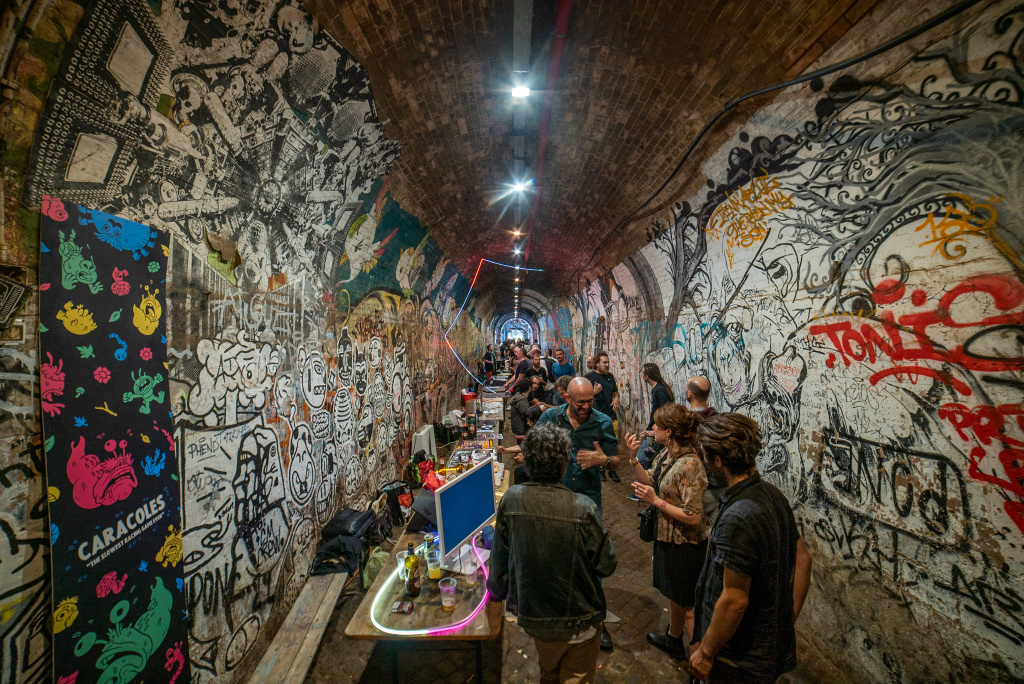
Game showcase at Centro Sociale Occupato Autogestito Forte Prenestino – Rome, credit: Videogamo
Zona Warpa was designed to be as accessible as possible, without (as much as we were able to) economic, architectural and geographical barriers. We published a clear code of conduct on our website, defining the event as “antifascist, antisexist and antiracist” and stressing that we believe that video games should be (and are) for everyone.
That’s why Zona Warpa has no entry fee. In fact, Zona Warpa hasn’t ever been intended to turn a profit: all the members of Collectivo Warpo, and everyone else helping us, are volunteers. We funded the event mostly through crowdfunded donations collected through two days of special live shows on Fabio’s Twitch channel, help from artists like Stefano “Ser” Togni and Luca Font, who made a series of Risograph prints we sold, a couple of extra events and, during Zona Warpa, donations at the entrance, a pay-what-you-want buffet and an equally pay-what-you-want shop of used video games. We chose a grassroots fundraising campaign instead of looking for a sponsor in order to be as independent as possible from companies.
Video games outside the capitalist system were shown and played in places and during an event outside the capitalist system.
Riccardo “Rico” Gamondi from Collettivo Warpo is part of music duo Uochi Toki and was the sound engineer of Zona Warpa. He’s also the owner of the camper van we used during the tour: he obtained it through barter.
“I proposed ‘Zona Warpa’ because I wanted an Italian-sounding name for once but we were also interested in the very concept of the Warp Zone, the bonus zone in Super Mario Bros. The Warp Zone is a space-time distortion, an anomalous situation. But a Warp Zone connects different places, too. You arrive in the zone and then you can decide to which world you want to go next. Doing it only in a big city like Milan would have meant doing maybe a different festival but in a place where you can already find certain ideas. We wanted to bring these ideas to smaller towns instead.
Deviants, people who divert from the usual social norms, tend to feel alone, because there’s so few of them, above all in the suburbs and during their teenage years. The opportunities of digital communication can help, but events like Zona Warpa allow you to meet other people like you, in person.”
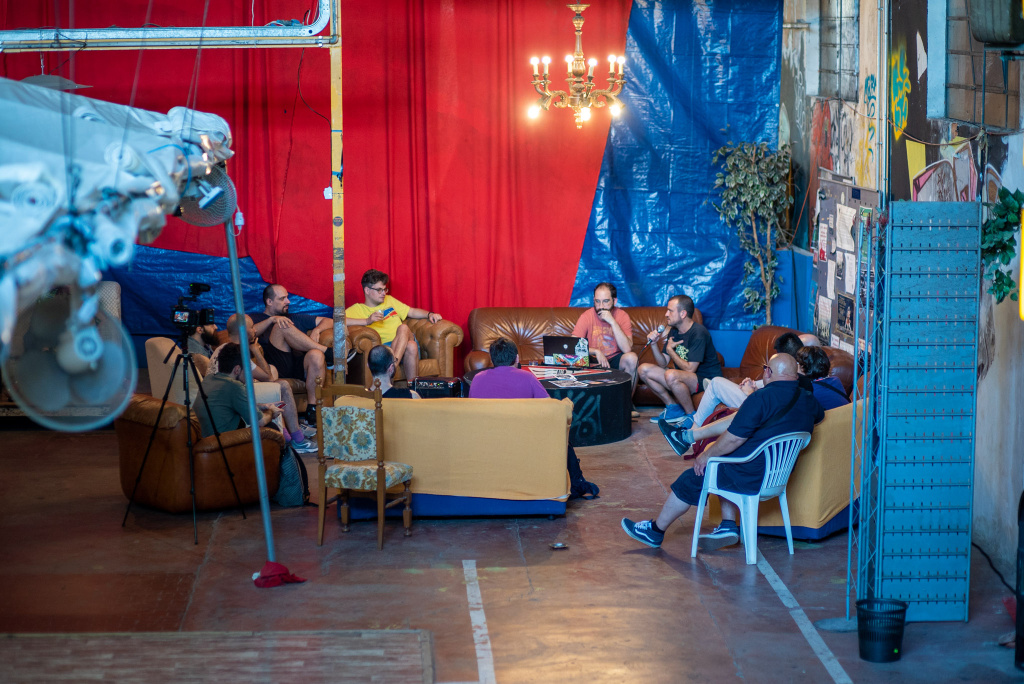
Talk at Centro Sociale Autogestito nEXt Emerson – Florence, credit: Videogamo
In the afternoon, alongside the video game showcase, we had talks and workshops, with a focus on video game making and DIY culture in general. We discussed modding (modifying commercial video games), ROM hacking (modifying the data extracted from video game storage media like Game Boy cartridges), comics making, independent music in platform capitalism and making music with old game consoles, developing interactive fictions, open source game engines and licences, the Argentinian underground scene, discrimination in the video game world, what we can learn from the mutualistic relationships we find in underground fungi networks…
We think it’s time to seize the means of game making, spread the knowledge about the increasingly approachable tools we have and stop seeing games and video games, software and hardware as industrial products we can only consume as fast as possible while waiting for their next iteration. Inside the Warp Zone, an old game is modified and becomes a new game and an old console is a musical instrument: they are creative tools.
Visual designer and creative director Claudia Molinari is one of the founders of game studio We Are Muesli, together with game designer and writer Matteo Pozzi. As part of Collettivo Warpo, We Are Muesli helped put the Italian game scene in touch with Zona Warpa and took care of most of the communication material.
“We call ‘communication’ what we’ve made, but for me it’s much more: it’s source material for a chapter about the Italian video game avant-garde in a future history book. Nowadays we look like small islands, but I want us to become an archipelago. That’s why we have to document and create a heritage for our community. Thinking from this perspective makes me design without focusing on the immediate gain. And we want to build events that propose an idea of playfulness that’s different from what you find in the mainstream.
We want people to have the tools to make games outside market logic. Instead of writing a traditional love letter some people compose a song and others draw a picture, and I’ve never understood why you couldn’t make a game. Play is not considered a creative form naturally part of our daily life.”
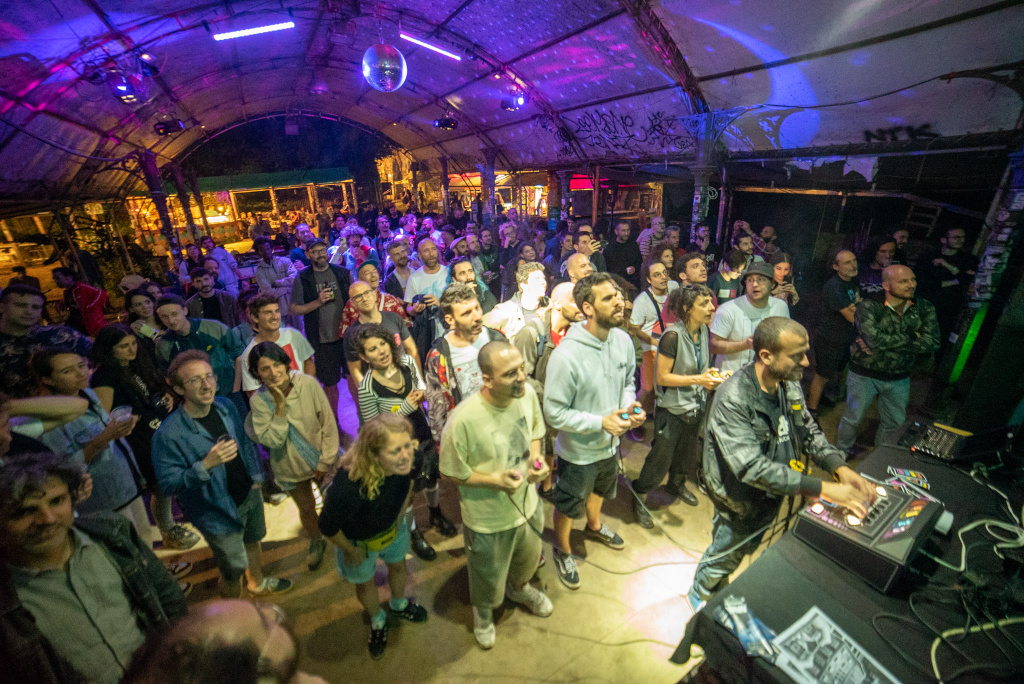
Dobotone at Centro Sociale Occupato Autogestito Forte Prenestino – Rome, credit: Videogamo
In each edition of Zona Warpa we want to have a foreign developer or studio travelling with us. We want to bring people outside of the usual regions associated with the video game industry (Europe, North America, Japan and China) to Italy, in order to show Italian developers and players works they would have otherwise never known, and in order to foster relationships between different underground cultures and communities.
For our first year, we hosted the Argentinian studio Videogamo, known for their arcade shoot-’em-up game NAVE, which exists in only one copy, a complete arcade cabinet Videogamo built by recycling old machines, and which is only made available during specific events.
But NAVE is too big for intercontinental travel, so they brought another game for the Zona Warpa tour: the multiplayer collection of chaotic micro party games Dobotone, which runs on another custom-made machine. Four players compete against each other, with one-button controllers, one in each hand (Dobotone comes from “dos botones,” i.e. “two buttons”), while a fifth person can tweak the settings of the match on-the-fly by turning a series of knobs.
In a similar way to Zona Warpa, NAVE and Dobotone are not commercial products designed to generate profit, but opportunities for sociality and community-making.
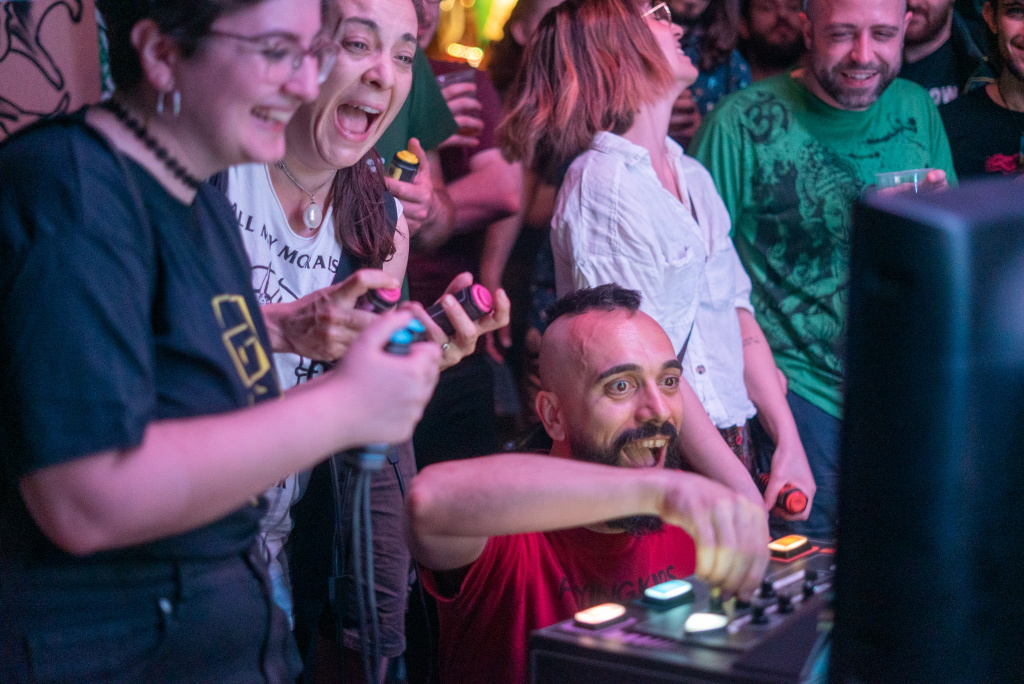
Dobotone players, credit: Videogamo
Hernán Sáez is the visual and sound designer of Videogamo, and he co-founded the studio together with programmer and game designer Máximo Balestrini. Five years ago they became a trio with the addition of Paloma Balestrini, who helps build the hardware and organise their events.
“The NAVE arcade cabinet was initially created for a limited-time event, but then people started inviting us. And we understood that the most important thing was how thanks to this arcade game you could meet new people and make new friends, without even the need of a spoken language. Arcade games make you connect in a respectful way with people you don’t know and even a single-player game like NAVE is played together: you are in the same place supporting each other and competing.
We understood that what makes NAVE interesting are the things happening around the cabinet, and so Dobotone was entirely designed in order to encourage interactions between players. We don’t see it as a game or a console but as a tool for having fun: you can hack the system, you can steal the controllers of another player, and it has been made to allow this kind of emergent gameplay.”
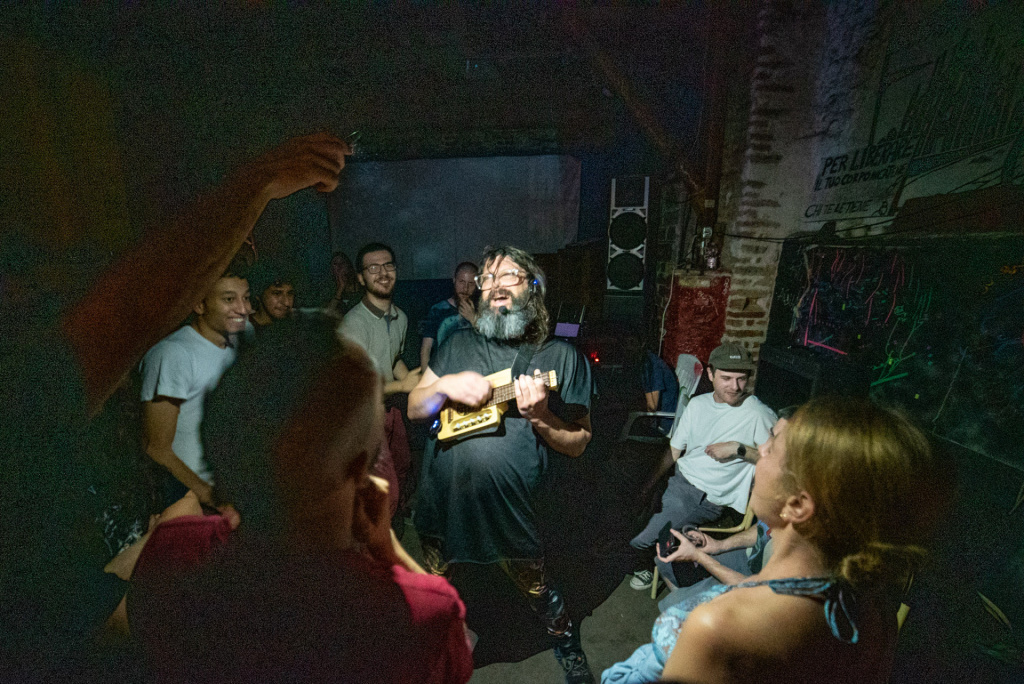
Los Pat Moritas at Cascina Autogestita Torchiera senzacqua – Milan, credit: Videogamo
In the evening, we had group matches of Dobotone and music shows with artists like Fabio, who composes and performs on Nintendo’s old handheld console Game Boy, Rico, who improvises on the more recent Nintendo DS, and London-based Argentinian musician and game designer Nahuel “Naku” Berneri (Los Pat Moritas), who mixes the rhythms of Colombian folk music cumbia, and the sounds of game consoles.
That’s the kind of community we were thinking about. We looked for zones of freedom in cities designed for those production and consumption cycles that are jeopardising the future of human and non-human life. And there, game developers, musicians, and visual artists were able to create, play, travel, eat, sleep, dance and imagine and practise new ways of living together


